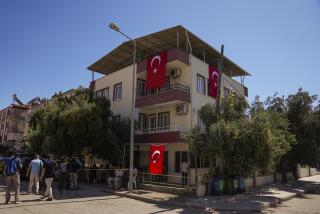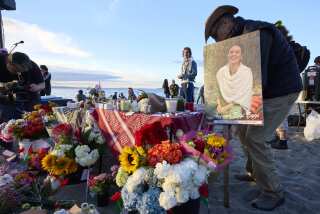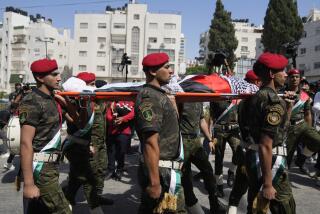Marchers Demand Turkey Account for ‘Disappeared’
- Share via
ISTANBUL, Turkey — For the veteran of the protests held in the 1970s by Argentine women seeking word of missing loved ones, there have been 20 long years of unanswered grief.
For Hatice Tekdag of Turkey’s ethnic Kurdish community, there have been two long years of not knowing what happened to her husband.
On Saturday, these two women and about 100 sympathizers here joined forces with demonstrators organized by Amnesty International in 20 countries to condemn the disappearance of, by one estimate, at least 135 people in Turkey since 1991. Most of the missing were last seen in the hands of Turkish police.
“Governments must know that the people they murdered have not been forgotten by their families and that they will look for them until the end,” said Mirta Acuna de Baravalles, one of the Argentine women who helped begin protests in Buenos Aires during the 1970s over the disappearance of thousands of dissidents. Her daughter is still unaccounted for.
The Istanbul march was the 75th weekly protest held by relatives of Turkey’s “disappeared.” Most of the missing are Kurdish nationalists.
More than 21,000 people have been killed in 12 years of warfare between Turkish security forces and guerrillas of the Kurdistan Workers Party, or PKK.
Amnesty International is focusing on the problem of the disappeared in Turkey, alleging that there is a pattern in the country of torture, extrajudicial killings and prosecutions of journalists and writers.
Nobody knows exactly how many Turkish citizens have wound up missing after being seized by security forces since disappearances reportedly became common in 1991, but Amnesty International researcher Carsten Jurgensen said there are at least 135 cases that are well-documented.
Although the number of disappearances reported has dropped since the Turkish mothers began their Saturday vigils, Jurgensen said it is still too early to know if there has been a fundamental change in Turkey’s attitude toward dissent.
*
After a European Parliament decision Thursday to apply new sanctions limiting financial assistance--and after continuing delays in U.S. arms shipments due to congressional objections to how the arms are being used--Turkey has said it is preparing reforms.
These will include a reduction in the initial period of detention allowed the police--the time, human rights groups say, during which torture most often occurs.
Meanwhile Tekdag, 42, awaits word of her husband, who was seized as he walked beside her in the southeastern town of Diyarbakir in November 1994.
“They bundled him off with a jacket over his head,” said Tekdag, the mother of seven. “At the police station, they denied taking him at all. A newspaper earlier this year quoted a policeman who said he had been tortured for 120 days, shot dead and buried in a field.”
One of her daughters, a reporter with a leftist publication, has been detained, she said. Her husband had previously been jailed for six years on suspicion of membership in the PKK.
“My husband was a Kurdish patriot, but he had no links to illegal groups,” she said. “I’ll look for him as long as I am alive, and will not rest until I find his body.”
More to Read
Sign up for Essential California
The most important California stories and recommendations in your inbox every morning.
You may occasionally receive promotional content from the Los Angeles Times.













